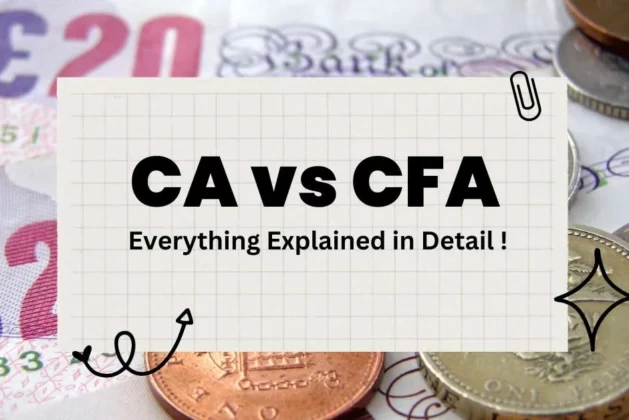Table of Contents
ToggleIntroduction
CA vs CFA, what to pursue? Are you considering a career in finance but unsure which Chartered designation to pursue? You may have heard about the Chartered Accountant (CA) and Chartered Financial Analyst (CFA) programs and are wondering why they differ. This blog part will provide an introduction to both courses, discussing the differences and analyzing the various career options accessible.
Here are some distinctions between CAs and CFAs. A person who has passed professional accounting tests in their own country and gained work experience in their chosen sector is referred to as a Chartered Accountant (CA).
Auditing, tax guidance, and business consultancy are some services they offer. Contrarily, CFAs are those who have successfully finished a rigorous self-study program encompassing subjects including investment analysis, portfolio management, and ethics.
CAs are more likely to specialize in accounting and auditing, whereas CFA holders may work as financial analysts or portfolio managers. Additionally, there are various positions available that require one or both credentials, for example in corporate growth or asset management. Therefore it is important to research the many possibilities available before deciding.
CA vs CFA Qualifications

Those of you with an interest in accounting and finance may be familiar with the argument between CFAs and CAs. It might be challenging to choose which certification to seek because both have grown in popularity among professionals. For you to make an informed choice, let’s examine what each certification has to offer and contrast them with one another.
The CA qualification is offered by several universities in the UK, US, and Canada, demonstrating its global recognition. You must finish an approved course of study and pass tests given by the Institute of Chartered Accountants in your nation to become a CA. You must adhere to specific requirements, protocols, and ethical guidelines established by the Institute to become a CA.
Although it is not required for employment, many firms prefer applicants who have successfully obtained their CFA qualification. To become a CFA, you must first have 48 months of professional work experience and then enroll and pass three levels of exams administered by the CFA Institute.
The three levels of the CFA charter examination cover topics such as economics, financial analysis, and portfolio management.
Certificates for both courses have similar international reputations among businesses, however, they provide alternative paths for pursuing your studies in accounting or financial sectors. CA and CFA are good career choices depending on your career objectives and end goals. Therefore, you should choose wisely between the two certifications.
Which exam is harder, CA or CFA?
It might be challenging to choose between both tests. Both are professional certifications that need diligence, devotion, and self-control. The examinations are intended to evaluate a candidate’s education, work history, and skill set. Which is more difficult to pass?
Taking both exams into account, there are certainly many things to consider. The exam structure is the primary factor to be aware of- the CA exam consists of three levels and the CFA is just a single stage of multiple-choice questions. Preparing for either program can be quite challenging; though the former involves more intensive study whereas the CFA is a much shorter duration.
A second factor to consider is the level of difficulty of the two exams. Although both tests demand dedication and discipline to grasp their subjects, CFA exams need more theoretical comprehension than the other exams, making them more difficult in general.
CA vs CFA: Exam Pattern

Let’s compare the numerous test patterns to help you make a good decision
The CA program comprises three levels of qualification:
- Foundation
- Intermediate
- Final exams
To qualify for the Foundation exam, you must pass 10+2 or an equivalent examination with 50% marks. There are four papers at the Intermediate level, including Accounting, Corporate Laws and Other Laws, Direct Taxes and Indirect Taxes, or Cost & Management Accounting. In addition, there are two groups at the Final level: Group 1 and Group 2. Each group consists of two papers.
When a comparison happens between the two, the CFA exams come in a modular format of three levels. The first level includes “Financial Reporting and Analysis” which covers topics like financial statements, accounting standards, financial markets and instruments, and budgeting principles. Moving on to “Quantitative Methods” for linear algebraic equations, followed by “Economics” classified into microeconomics and macroeconomics; then “Financial Statement Analysis”; afterward “Corporate Finance”; and finally concluding with “Equity Investments Analysis” a course that covers equity valuation, portfolio construction, and management.
CA vs CFA: Course Duration
The CA and CFA courses can vary considerably in length when compared to one another. Both certificates have their benefits, but if you’re attempting to decide between them, it can be useful to take the time commitment and structure of each into account.
The CFA Institute offers the Chartered Financial Analyst (CFA) program, which is divided into levels with examinations. To become a CFA charter holder, you must complete each level, as follows:
Level 1- 10 months
Level 2- 9 months
Level 3- 6 months
In comparison to the CA course, which lasts three years, the CFA certification can take up to 24 months or two years, depending on how quickly you complete the required studies for each level. The study and passing of exams in both courses require significant time commitments.
Additionally, both courses require rigorous self-study, so you should determine which course suits your current life situation before choosing one.
CA vs CFA: Course fees in India
Would you like to pursue a career in finance, but are unsure what direction to take? Both qualifications are highly regarded in India. While many students and professionals just decide to pursue both, it can be challenging to decide between the two in a well-informed manner. Here’s how to evaluate the costs of both courses so you can choose wisely.
It costs about Rs. 16000 to register for a CA degree and up to Rs. 3 lakhs for exam fees and tuition to complete the entire degree. A student’s cost can also rise substantially if additional attempts are needed to clear the exam, based on the number of attempts made. For CFA, the early Registration fee in 2023 for August and November is $900. The Standard Registration for the same sessions is $1200. Plus, the Early Registration fee for February 2024 session is $940, and Standard Registration Fee for the same is $1250.
In addition, there is a one-time Enrollment Fee to be paid when registering for the Level 1 Exams, which is $350. Students can also reschedule their exam window but at an additional cost of $250.
The cost increases depending on the number of times a person attempts to clear any particular level and includes additional charges for late registrations, re-exams, etc.
Even though both credentials require a significant investment of time and money on the part of the student, CFA candidates have some advantages over CA candidates, including flexible enrollment options with features such as self-paced learning and discounts on bundles or study materials purchased from specific vendors.
Earning Potential & Career Opportunities

Becoming a CA or CFA can open up incredible prospects for you, so understanding the differences between them is essential. Both Certified Accountants and Chartered Financial Analysts are highly respected in their field and bring with them a particular set of skills and advantages. Let’s take a closer look at how either career path may help you attain your financial targets and provide earning potential in the future.
CA vs CFA: Job Scope
The tasks of Chartered Accountants (CAs) encompass financial statement preparation, auditing, and assurance services. Working with individual customers and business clients, CAs are accountable for assessing the financial standing of companies, supporting executives in investment decision-making, dealing with tax receipts and filing, and administering financial planning.
On the other hand, Chartered Financial Analysts (CFAs) have a more targeted responsibility. Such professionals serve as investment consultants to institutional investors and affluent people/families by suggesting portfolios of stocks, bonds, and other investments that provide maximal benefits in the long or short term.
CA vs CFA: Industry Recognition
In terms of industry recognition, CAs, and CFAs are both regarded as specialists in their respective industries. The ability to pass an examination is necessary for either certification, so employers will recognize the commitment to professionalism and development within the industry.
The employer may be more likely to hire a CA or CFA who has taken a more rigorous exam than someone who only has qualifications from an in-house training provider.
Considerations for Risk Management
It is imperative for any professional financial practice to manage risk effectively. Effective risk management protects a firm’s assets, investments, and reputation. A few key considerations for risk management include regulatory framework, professional code of conduct, accounting standards, risk assessment, risk analysis, operational processes, reporting duties, and compliance requirements.
In a financial environment, two professional designations often come into play when conducting risk management activities: Chartered Accountant (CA) or Chartered Financial Analyst (CFA).
While CFAs are governed by the CFA Institute’s Code of Ethics and Standards of Professional Conduct, which guides gaining relevant knowledge and expertise in investment analysis and portfolio management.
It is the approach to risk assessment and analysis that differentiates these two roles. The Chartered Accountant is primarily concerned with GAAP-compliant accounting practices such as journal entries and bookkeeping procedures, whereas the CFA is more concerned with offering financial advice based on research-based facts.
Quantitative tools, such as Monte Carlo simulations, can also be used by CFAs to model financial risk factors associated with different investment strategies.
In addition to these differences in scope, both CFAs and CAs must understand the operational processes involved in their respective duties, as well as compliance requirements.
CA vs CFA: Cost Comparison

How much it will cost to train for the CA certification depends on your preferred learning method and course choices. Traditional courses, however, are frequently more expensive than online books and other study tools. To become an authority in your industry, both credentials need investing in yourself, regardless of the route you take.
To maintain your credentials, both of the courses require ongoing maintenance fees after they are certified. A CA certification requires a $100 annual renewal cost, whereas a CFA designation demands a $300 or $400 annual renewal charge.
Being a CA or CFA opens up several networking opportunities; one promotion could even lead to more job opportunities.
CA vs CFA: What’s the difference?
A key difference between the two is that CAs are typically tasked with providing financial advice and guidance, whereas CFAs are more concerned with investment analysis and portfolio management. The job description of a CFA varies from tax planning to auditing financial statements. Meanwhile, the latter will develop investment portfolios, analyze risks, and assess securities.
In terms of the quantity of schooling necessary, it is also vital to distinguish between the two. To become a CA, the Chartered Institute of Management Accountants (CIMA) demands at least five years of higher study in accounting or finance.
CFAs receive professional certification from the Society of Actuaries in London (SOA) after passing three intense tests over a two-year or more extended period.
Also, when comparing salary potentials, both designations offer competitive salaries, but CFA certifications typically offer higher wages. Depending on your experience and area of expertise, CAs could earn $60K- $86K annually. Those who hold CFA certifications earn much higher salaries, with salary ranges ranging from $70k to $172k.
Conclusion
The importance of Chartered Financial Analysts (CFAs) and Certified Accountants (CAs) in India cannot be overstated. As a result, both qualifications are in great demand, especially in the business sector.
Why do we require CA and CFA in India? Prospective students must pass the CA (Certified Accountant) and CFA (Chartered Financial Analyst) exams to become professional accountants or financial analysts. Though these two tests are recognized for their rigor and difficulty, completing them is seen as a big accomplishment in both corporate and government circles.
Auditing, taxation, corporate finance, and management accounting are some of the accounting topics covered by the CA. Among the topics covered in the CFA exam are portfolio management, security analysis, risk management, fixed-income mathematics, derivative markets, investment instruments, and more.
Both of them offer a comprehensive education on managing finances or providing strategic financial advice. Whether you’re looking for a job at an international company or looking to start your own business, both of the qualifications are extremely valuable if you’re looking for finance work.
These certifications can prove invaluable if you decide to move into investing or stock trading even if you cannot pursue either profession directly.
For more information, you can visit our Analytics Jobs
Frequently Asked Questions (FAQs)
According to the CFA Institute, when compared to CA, CFA is a more difficult course.
CFA is a better option for you if you want to acquire more knowledge in the field of financial or investment sectors. On the other hand, if you want to be better at accounting, auditing, and taxation, you must consider CA as your career option.
The average salary package of a CA is more as compared to CFA with an annual average salary of 7-10 lakhs.



